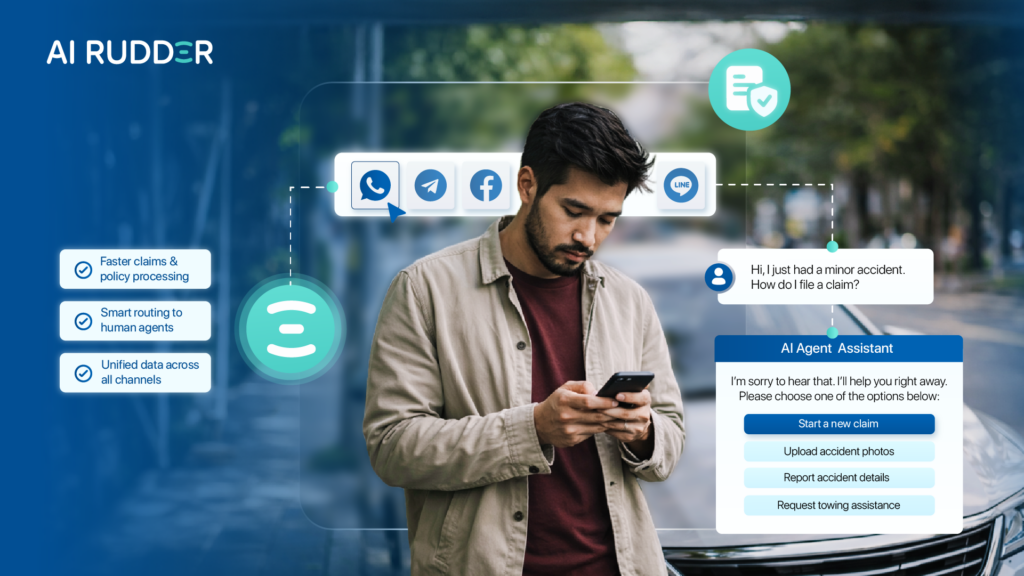
For years, the idea of AI in insurance felt more like hype than reality. Insurers experimented with early chatbots, hoping they would ease the pressure on call centers and improve customer service. But the reality was disappointing. These tools could only follow rigid scripts, struggled with anything beyond simple questions, and often left customers more frustrated than helped. Many insurers gave up with the idea, believing that conversational AI simply wasn’t ready for the complexity of their industry.
That was then. Today, thanks to the rise of large language models (LLMs), the story is very different. Conversational AI in insurance industry is no longer a future vision as it is now here, mature, and transforms how insurers handle claims, renewals, and customer service.
Why Early Conversational AI in Insurance Fell Short
Think back to those first-generation AI agent voicebots and chatbots. They were like call-center interns on their very first day: able to answer a handful of simple questions, but anything more complex, more often than not, left them stuck. Customers asking about policy exclusions, renewal options, or multi-step claim scenarios often hit a dead end.
Integration was another stumbling block. Those AI agents rarely connected well with policy databases or claims systems, forcing agents to step in anyway. And with security frameworks still underdeveloped, insurers hesitated to trust these tools with sensitive data.
The result? Early AI in insurance led to longer processes, not shorter ones. Both customers and insurers lost faith.
How LLMs Changed the Game
Now imagine a very different picture. A customer asks: “I filed a claim for my car accident last week. I already submitted the photos, so what happens next?”
In the past, AI agents would fail to connect the dots. Today, LLM-powered conversational AI understands the full context, retrieves the claim status, and guides the customer on next steps, even going as far as understanding the claim documents they submit, instantly and accurately.
This leap forward is possible because LLMs can even handle nuance, jargon, and even slang in ways old systems never could. They don’t rely on memorizing every possible phrase. Instead, they learn, adapt, and improve with every interaction. Modern solutions also integrate smoothly with claims management and CRM systems, while encryption and audit trails ensure compliance isn’t compromised.
This evolution is why conversational AI in insurance industry is finally ready for prime time.
The Pressure on Contact Centers
For insurers, the timing couldn’t be better. Contact centers are under immense strain: spikes in call volumes during claim surges, long hold times, rising agent turnover, and customers who now expect 24/7 support.
Human agents can only do so much. And when they spend most of their time answering routine questions like “When will my claim be processed?” or “When does my policy expire?”, their capacity for empathy-driven, high-value conversations shrinks.
This is exactly where conversational AI steps in.
Real Use Cases That Make a Difference
In insurance, conversational AI can create value on both outbound and inbound fronts. On the outbound side, it supports telemarketing campaigns, drives smoother onboarding, and even verifies customer information with high accuracy. On the inbound side, it takes pressure off contact centers by handling claims inquiries, resolving complaints, and providing 24/7 customer service that’s consistent and reliable.
Take our insurance clients as an example, AI-powered outreach in telemarketing campaigns boosted conversion rates significantly, turning more conversations into actual policyholders. In another case, conversational AI helped achieve a 90% connect rate, ensuring that almost every prospect reached got the right message at the right time. And in critical processes like policy or claims verification, accuracy in information-checking flows climbed to over 90%, reducing errors and building customer trust.
What makes today’s AI different is its ability to adapt. Ask it a “what if” question like “What if I renew late?” and it gives a contextual answer, not a canned response. That’s the power LLMs bring to the table.
Time, Trust, and Tangible Benefits
For customers, this means faster answers and less waiting. For insurers, it means agents are freed from repetitive tasks, average handling times drop, and ultimately operational costs shrink. Importantly, AI never sleeps, so customers can get answers at midnight, on weekends, or during peak claim seasons when human agents are swamped.
And unlike the old days, security is not an afterthought. Today’s conversational AI comes with security guardrails like encryption, data masking, and audit trails built in, turning what was once a compliance risk into a compliance advantage.
Will Conversational AI Replace Insurance Agents?
It’s a question many ask: Will AI replace insurance agents?
As much hype there is around conversational AI in insurance industry, the truth is, no. Conversational AI in insurance is not here to replace people, it’s here to support them. AI takes on the repetitive, high-volume tasks, while human agents focus on what they do best: empathy, negotiation, and handling complex claims.
The future isn’t AI versus humans. It’s AI plus humans. Working together to deliver faster, smarter, and more compassionate service.
Conclusion
After years of trial and error, Conversational AI in insurance industry has finally come of age. Thanks to LLMs, conversational AI can now reduce claims pressure, strengthen compliance, and deliver a customer experience that matches modern expectations.
For insurers, the choice is clear: those who embrace AI today will be the ones leading in efficiency, trust, and customer loyalty tomorrow.
Let’s Talk
We provide enterprise-ready AI solutions for insurance that are secure, scalable, and proven in real-world use cases.
Reach out today for a consultation to see how conversational AI can transform your claims and customer experience: business@airudder.com




